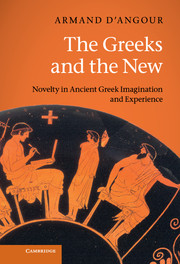Book contents
- Frontmatter
- Contents
- Acknowledgements
- Introduction
- Chapter 1 New, new, new
- Chapter 2 Loosening the grip of the past
- Chapter 3 The transformations of Kaineus
- Chapter 4 Old and new
- Chapter 5 Nothing new under the sun
- Chapter 6 The birth of Athena
- Chapter 7 Inventions of Eris
- Chapter 8 The newest song
- Chapter 9 Constructions of novelty
- Chapter 10 So what's new?
- References
- General index
- Index of Greek terms
- Index locorum
- References
Chapter 3 - The transformations of Kaineus
Published online by Cambridge University Press: 07 September 2011
- Frontmatter
- Contents
- Acknowledgements
- Introduction
- Chapter 1 New, new, new
- Chapter 2 Loosening the grip of the past
- Chapter 3 The transformations of Kaineus
- Chapter 4 Old and new
- Chapter 5 Nothing new under the sun
- Chapter 6 The birth of Athena
- Chapter 7 Inventions of Eris
- Chapter 8 The newest song
- Chapter 9 Constructions of novelty
- Chapter 10 So what's new?
- References
- General index
- Index of Greek terms
- Index locorum
- References
Summary
In nova fert animus mutatas dicere formas corpora…
Ovid‘Into new forms my spirit bids me venture, to tell of bodies changed in shape’. With the programmatic opening words to his Greek-titled Metamorphoses, the Roman poet Ovid underscores the centrality of novelty and metamorphosis to the Greeks’ mythical imagination. Innumerable Greek myths tell of literal transformations by gods, such as those undergone by Zeus in his pursuit of amours – changing into a bull to seduce Europa, a swan to seduce Leda, a shower of gold to penetrate Danae. Mortals too may be transformed – Teiresias into a woman, Kainis/Kaineus into a man, Hekabe into a she-dog, Ariadne into a constellation. In the Homeric Hymn to Dionysos, sailors are turned into dolphins; in the Odyssey, Odysseus’ companions are changed into pigs and back again. The way new things are seen to emerge is through a change in someone's, or some thing's, form or nature.
Epic poetry explores the potential of human beings to be transformed in a figurative way, through experiences, trials, the acquisition of knowledge. In real life too, an athletic victor, transformed by success, might become a ‘new’ person, even a demi-god and object of cult. The impersonation required by drama, itself a genre that appears to have metamorphosised from ritual performances, led to the growth of the acting profession, in due course producing star performers skilled in playing new roles and characters. In the performance of Mysteries, Dionysiac or Eleusinian, initiates underwent spiritual metamorphosis, seeking to gain access to new vision and to a new life beyond death by conducting secretive rituals. The plots of Aristophanes’ comedies often play on the notion of such transformations: older male characters such as Trygaios in Peace, Philokleon in Wasps, Strepsiades in Clouds and Peisetairos in Birds are portrayed as being reinvigorated and rejuvenated, after undergoing trials and adventures resembling or recalling those undertaken by mystic initiands. Dionysos himself, the god of theatre, is prone to metamorphic epiphanies as a bull, goat or snake. The divine embodiment of the vine and the god of masks and illusion, his transfiguring nature was transferred to the theatre, with its impersonating masks and performative transvestism, its capacity to transport its listeners to different times and places, its potentially cathartic effect on audiences.
- Type
- Chapter
- Information
- The Greeks and the NewNovelty in Ancient Greek Imagination and Experience, pp. 64 - 84Publisher: Cambridge University PressPrint publication year: 2011



